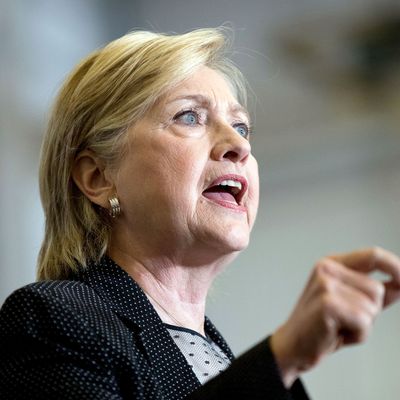
Hillary Clinton is running against a pseudo-fascist who wants to abolish the estate tax and deport 11 million people. Several recent national polls put her ahead of Donald Trump by double digits. If the Democratic nominee wanted to pivot to a more centrist economic agenda, she’d have the political cover to do so. Progressive voters have nowhere else to go. And even if a Trans-Pacific Partnership flip-flop sent some of Bernie’s backers to Jill Stein, Clinton could probably make up their votes through the defections of moderate Republican women.
Fears that Clinton would make precisely that calculation have long troubled left-wing Democrats. And in recent weeks, the Clinton campaign has shifted its gaze toward the other side of the aisle: At the Democratic National Convention, multiple speakers spoke wistfully of Ronald Reagan, while anti-Trump Republicans and independents announced that they were “with her” — for non-ideological reasons — in prime time. In the days since the DNC, the Clinton campaign has rolled out a series of endorsements from former GOP officials.
But even as Clinton has sought to co-opt Republican bureaucrats, she’s continued to campaign on the progressive economic agenda that she and Bernie Sanders haggled over at the end of the primaries. At the DNC, Clinton blamed our economic woes on a rigged campaign-finance system and proposed raising taxes on the rich to fund a series of (modest) expansions to the welfare state.
And on Thursday in Michigan, Clinton reiterated her commitment to that agenda in her scathing critique of Donald Trump’s economic plans.
“Now, there’s a myth out there that he will stick it to the rich and powerful because, somehow, he’s on the side of the little guy,” Clinton said of Trump before a crowd of supporters. “Not when he pledges to rip up basic rules that keep corporations accountable.”
Clinton proceeded to assail the “moratorium” on federal regulations that Trump proposed in Detroit on Monday, saying Trump would allow corporations to pollute the water our children drink, while giving Wall Street a free pass to wreck the economy again. By contrast, Clinton vowed to subject the finance industry to “tougher rules.”
She also called for a more “progressive, patriotic tax code” that would force corporations to pay back any tax breaks they received from the U.S. government, should they decide to relocate overseas. She went on to propose higher taxes on multimillionaires and hedge-fund managers.
Then she laid into Trump’s latest tax plan, noting that his cut in the top marginal rate would provide the 400 richest families in America with an additional $15 million a year.
“And then there is the estate tax, which he wants to get rid of,” Clinton continued, noting that, if Trump is really worth what he says he is, then repealing the estate tax “would save the Trump family $4 billion, and 99.8 percent of Americans would get nothing.”
Clinton attacked Trump’s few remaining claims to economic populism, noting that his child-care tax deduction would subsidize the nanny bills of rich people, while providing no assistance to America’s poorest families. And on trade, Clinton reminded her audience that Trump doesn’t practice what he preaches, as he outsources many of his own company’s jobs to foreign countries. Then she reiterated her opposition to the TPP in the strongest terms she’s ever used on that subject.
“I will stop any trade deal that kills jobs and holds down wages, including the Trans-Pacific Partnership. I oppose it now, I’ll oppose it after the election, and I’ll oppose it as president.”
Opponents of the TPP fear that the agreement could pass during Congress’s lame-duck session in December. Clinton’s quote constitutes a pledge to oppose such efforts.
And for all the Reagan nostalgia on display at the DNC, Clinton concluded her indictment of Trump with a swipe at Reaganomics, calling the GOP nominee’s agenda a combination of the “failed theory of trickle-down economics with his own addition of outlandish Trumpian ideas that even Republicans reject.”
By the end of her speech, Clinton had called for a public health-care option in all 50 states, free public-college tuition for the middle class, relief for student debtors, increasing unionization to help boost wages in the service sector, subsidized training programs to ensure that a four-year college degree isn’t the only pathway to economic security, an expansion of the child tax credit, and paid family leave.
Perhaps most significantly, Clinton explicitly rejected the paradigm that suggests attempts to promote economic equality come at the cost of economic growth.
“Raising the federal minimum wage doesn’t just put money in the pockets of working families — it also means they will spend more in their neighborhoods … We need to get wages and incomes rising, and it will help the whole economy grow,” Clinton said. “Strengthening unions doesn’t just serve members, it leads to better wages and working conditions for all employees.”
It’s clear that the Clinton campaign wants to put together the broadest possible coalition in the hopes of engineering a November landslide. It’s also clear that they have no intention of moving right on economic policy to do so.






























